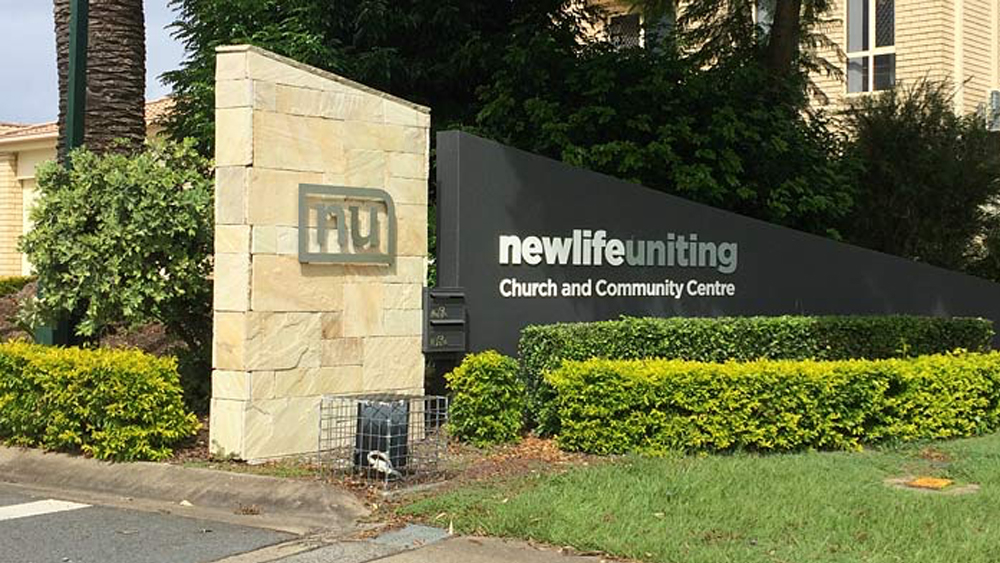Taking 'Uniting' off the signboard
Uniting Church’s largest congregation wants distance
The signs on the Gold Coast’s Newlife Church won’t say “Uniting” any more. The closest thing the Uniting Church in Australia (UCA) has to a megachurch, with 1700 attending each weekend, wants to remain committed to traditional marriage.
The UCA’s second marriage rite, which can be used for same sex marriages, becomes official on Friday September 21, sitting alongside the existing traditional man-woman rite.
About 2500 to 3000 people regard Newlife as their church home. The church has 110 small groups, runs the evangelistic Alpha course regularly, and racks up 91,000 volunteer hours per year. It has grown 7 to 11 per cent annually over the last decade. Amazingly enough, about ten per cent of the UCA’s Queenslander church attenders go to Newlife.
Evangelicals are seeking to form safe places if they are to stay within the UCA, networks or “presbyteries” of like-minded, traditional marriage-affirming churches that aren’t limited by location.
Besides changing their name from Newlife Uniting, to the plainer Newlife Church following 40 days of prayer and fasting about their future, and an overwhelming congregational voted the Gold Coast church will:
• Affirm an earlier UCA statement that “marriage is the freely given consent and commitment in public and before God of a man and a woman to live together for life”.
• Affirm its long-held position that the appropriate expression of our sexuality is celibacy in singleness and faithfulness in marriage.
• Affirm the position of the church council that the property of Newlife not be used for same sex marriages. Under the UCA’s decision to adopt two views of marriage, church councils have that right.
The next part of the Newlife decisions might be more contentious as far as the UCA is concerned. Evangelicals are seeking to form safe places if they are to stay within the UCA, networks or “presbyteries” of like-minded, traditional marriage-affirming churches that aren’t limited by location.
The idea of church within a church emerges every time the issue of same sex marriage threatens a split (Current examples include the world-wide Anglican Communion and the United Methodist Churches in the USA and Africa).
After a few presbyteries passed motions calling on the national assembly to reconsider their marriage decision, the UCA authorities pushed back.
Leaders in the Queensland state branch of the UCA sought and received advice from the UCA’s “Church Polity Reference Committee”. This is a national committee that interprets the rules of how the UCA operates. The advice was to the effect that a presbytery can hold a view concerning same sex marriage, but can’t impose it on other parts of the church.
The polity ruling if applied to the new “non-geographic presbyteries” evangelicals are seeking would make their proposals for safe spaces very difficult to achieve.
In South Australia, a network of 60 evangelical churches in the UCA has announced that it too seeks to form a non-geographic presbytery.
“We propose that Hope Network apply to the Synod of SA to be formed into a non-geographic Presbytery, and become Hope Presbytery,” the HopeNet executive said in statement. “We would then recommend to all congregations of Hope Network that they make formal decisions (by a two thirds majority) to become congregations of Hope Presbytery.”
The President of the Uniting church, Diedre Palmer has issued a call for unity.
“In the light of the Assembly’s discernment to allow our Church to affirm two equal and distinct views on marriage, I have seen the grace of God reflected in many of our interactions with each other,” she wrote. “Uniting Church congregations, individual members and leaders have sought to truly listen to each other, and seek to understand how we can live in community with one another, while seeing the Biblical witness and our theological foundations through different interpretive lenses.
“Passionately disagreeing with one another is not unusual in the church. If we are to grow in maturity, as a follower of Jesus in the 21st Century, we will be deeply engaged in reflecting on Scripture and theology with others who may express their Christian discipleship in ways different to ourselves.”
Pray
Some prayer points to help
Nearly every congregation will have people who disagree with the majority on this issue. Disagreeing on this topic is emotionally wrenching. Pray for churches in distress.



